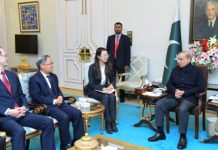DNA
ISLAMABAD: Prism Energy (Private) Limited (‘Prism’), an end-to-end renewable energy solutions provider, recently commissioned its first commercial and industrial (C&I)solar energy facility in Faisalabad, Pakistan. The development and implementationof the 248kW facility was led by the Prism team, with the support of InfraCo Asia and Albario Engineering Private Limited (AEPL).
Islamabad, Pakistan – 22 February 2021
With its high solar irradiance, there is tremendous potential forPakistanto harness solar power to meet its energy needs. According to the World Bank, utilising just 0.071 percent of the country’s area for solar photovoltaic (PV) power generation would meet Pakistan’s current electricity demand. However, much ofPakistan’s abundant solar resource remains untapped, with renewable sources currently fulfilling only around 4% of the country’s energy needs.In order to achieve its national target to generate30% of its energy from renewable sources by 2030, Pakistan will require greater private sector investment in renewable energy infrastructure, including high-quality, distributed solar solutions.
InfraCo Asia, aPrivate Infrastructure Development Group (PIDG) company, and AEPL haveentered a joint investment and development agreement establishing Prism Energy –a joint venture company, to developand implement commercial & industrial (C&I) solar projectsacross Pakistan, thus providing new and improved access to clean and renewable energy sources. Prism aims to introduce international best practice to distributed solar development in Pakistan, byleveraging the development expertise of InfraCo Asia, as well as the on-ground experience of its local partner AEPL.
The Prism team brought into operations its first C&I solar energyfacilityin January 2021, providing electricity to the Pearl Towers in Faisalabad, Pakistan. The 248kWfacility is part of Prism’s larger C&I solar platform, through whichits shareholders are aiming to rollout C&I solar projectsat scale. By demonstrating the commercial viability of high-quality, net metered C&I solar solutions, InfraCo Asia and AEPL expect to crowd-in greater private sector investments for Pakistan’s distributed solar sector.
The newly commissioned solar plant,which is built on two rooftops of the Pearl Towers in Faisalabad, supplies affordable, reliableand renewable energy that is able to meet the energy needs of the commercial complex during the day. This includesthe operation of its shopping mall,restaurants andoffices. It is expected that the solar plantwill enable energy bill savings for Pearl Towers, andimprove the overall sustainability of operations by reducing its reliance onelectricity from the national grid, which is primarily derived from the burning of fossil fuels.The solar plant is also expected to improve the reliability of energy access by reducing each client’s reliance on the grid, which suffers from frequent power outages.
“We are delighted to be part of the transition towards solar energy sources with Prism Energy and appreciate the Prism team’s professionalism and support in the process. Pearl City Towers is one of the largest commercial projects in Faisalabad, and we are proud to lead in the city’s sustainability journey. The solar plant will help reduce our energy bills significantly” said Ibtasam Iqbal, CEO of Pearl Group.
Following the implementation of the Pearl Towers project, Prism Energy is looking to replicate its success across Pakistan, with several larger-scale distributed solar projectsof up to 5MW currently in the pipeline.Prismprovides turnkey renewable energy solutions,developingC&I rooftop and ground-mounted solar plants on a commercial basis, with no upfront costs to the site owners. Electricity generated from the solar plants is sold to the site owners under a long-term (15-20 year)offtakeagreement, at tariffs that are discounted in comparison to thoseoffered by state-owned distribution companies in Pakistan. The net metering arrangement will also enable clients like Pearl Towers to sell surplus energy back to the national grid, resulting in further cost reduction.
At present, high development risks continue to be associated with Pakistan’s distributed solar sector due to the lack of regulatory support and high-quality developers. Through thePrism Energy joint venture, InfraCo Asiaand its joint venture partner AEPLaim to de-risk the development of distributed generation solar power projects in Pakistanby introducinginternational best practice at each stage of the development and implementation process. Coupled withproven models of offtake agreements, Prism Energy will demonstrate the commercial viability of developingdistributed solar plants to world-class standards in Pakistan. In so doing, InfraCo Asia and AEPL aim to pave the way for other private sector investors and developers to implement high-quality solar power infrastructure, and thus promote the uptake of equivalent renewable energy solutions.
Allard Nooy, Chief Executive Officer of InfraCo Asia said: “We are very heartened by the safe and healthful progress made by the Prism Energy team during this challenging time. Through the joint venture, InfraCo Asia is working with AEPLwith an aim to develop up to 40MW in aggregate solar power generation capacity– thereby demonstrating the commercial viability of a world-class, distributed solar model for Pakistan. We hope that this will pave the way forgreater private sector investments in renewables, and support Pakistan’s ambitions to transition towards generating 30% of its energy from renewable sources by 2030.”
Ahmad Najeeb, Chief Executive of AEPL expressed, “We are excited to commission our first project with Prism Energy and look forward to executing a strong pipeline of projects in 2021 and 2022. At Prism, we are strongly committed to build, own and operate green energy projects across the country.”
Arooj Asghar, CEO of Prism Energy, added, “This is a significant milestone for our team, to successfully manage and commission the project in a safe and timely manner. We expect a strong and positive response from the market considering the needs of businesses in Pakistan, the lack of reliable and economical power, and the strong development practices we bring to the table.”












